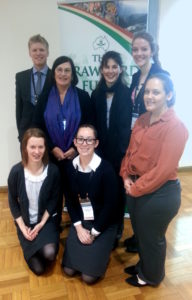

2014 Young Scholar: Julia de Bruyn

Front: Julia de Bruyn, Katherine Ashley, Kirsty McCormack
Julia de Bruyn
University of Sydney
Sponsored by the NSW Committee
Julia is a veterinary science graduate from the University of Melbourne, currently working as a research assistant and Masters student on an ACIAR-funded project at the University of Sydney. This work is aiming to improve food and nutrition security in sub-Saharan Africa, through the introduction of Newcastle disease vaccination programs and cropping interventions. Julia’s focus is on the potential contributions of chicken and eggs to the diets of pregnant and breastfeeding women and young children. Julia is interested in the close ties between animals and human health in developing countries. She is looking forward to meeting other young researchers and learning from key players in the food security arena at the Conference.
Conference report
The conference’s broad range of presentations was highly valuable in expanding my understanding of current challenges, priorities and progress in the area of food security.”
Participating in The Crawford Fund’s 2014 Parliamentary Conference as a “young scholar” was a greatly rewarding experience. As a relative newcomer to the world of international agricultural research, I was very enthusiastic at the prospect of attending the event. Less than twelve months ago, I was working as a locum veterinarian in the United Kingdom and my experience of Africa involved having spent a couple of weeks backpacking in Morocco. I am now undertaking a Master of Veterinary Science research degree and working as a research assistant on a food and nutrition security project based in Tanzania and Zambia, funded by the Australian Centre for International Agricultural Research (ACIAR).
The conference’s thematic focus on ethics and efficiency resonated well with my research in sub-Saharan Africa. My MVSc project (“Healthy Chickens, Healthy Children”) aims to assess the impact of community-based Newcastle disease programs on chicken numbers and explore how this can translate into improvements to maternal and child nutrition. Community consultation and involvement of women form part of an ethical approach, while reducing mortality due to Newcastle disease will improve the efficiency of village poultry systems, increasing their contribution to food and nutrition security.
The Sir John Crawford Memorial Address, by Professor Catherine Bertini, included an emphatic call for research efforts to identify and respond to the needs of female farmers. Professor Bertini recognised women and girls as “crucial contributors” to food and nutrition security. Women are a particular focus of my work in Tanzania and Zambia: being primarily responsible for poultry-keeping in the village setting and closely involved in the intra-household allocation of food resources.
The conference’s broad range of presentations was highly valuable in expanding my understanding of current challenges, priorities and progress in the area of food security. I was particularly interested to hear from Dr Shenggen Fan, who highlighted the high economic return of eliminating global hunger; Dr Norah Omot, about efforts to give nutrition a greater focus in food security projects in Papua New Guinea; and Dr Helen Szoke, on reducing food waste.
Beyond the engaging speakers and interesting presentations, the opportunity to meet other delegates was a major highlight of the conference. It was great to speak to other students and early-career researchers with a shared interest in international agricultural research, including those working in similar geographic and subject areas, as well as conference participants further advanced in their careers – both during the conference itself and at the Young Scholars’ Day. I look forward to pursuing opportunities for future collaboration and knowledge-sharing.
Among positive outcomes of the conference are plans for a Sydney branch of Researchers in Agriculture for International Development (RAID). Having spent time in remote communities over the past twelve months, I appreciate the value of a network that connects young researchers on a similar career path. I have attended several food security-related events in recent weeks, hosted by different faculties within the University of Sydney. I hope that our plans for two RAID events in the coming month (a lunch-time gathering and a seminar night) will work well to unite students from across campus and other interested people from around Sydney.
I am very grateful for the generous support of The Crawford Fund to attend the 2014 Parliamentary Conference, and I look forward to continuing involvement in future events and initiatives.